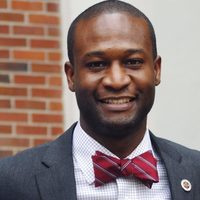Speaker: Kareem Usher
Item
- Title
- Speaker: Kareem Usher
- Description
-
Dr. Kareem Usher is an Assistant Professor of City and Regional Planning in the Austin E. Knowlton School at The Ohio State University. Dr. Usher received his Bachelor of Arts degree in Sociology from Spalding University in Louisville, Kentucky, a Masters of Urban Planning degree from the University of Louisville also located in Louisville, and a doctoral degree in Urban and Regional Planning from Florida State University in Tallahassee, Florida. His research interests focus on urban food systems and he engages this topic at the intersection of food access, social justice, regional governance and community economic development. Dr. Usher’s work involves utilising mixed-methods and community-based participatory research methodologies to explore perceived as well as objective measures of access to healthy food of food-insecure families in low-access (‘food gap’) communities.
The long view of Dr. Usher’s life’s work would embody the idea of Planning to Reduce Human Suffering. This theme fuses two branches – Spirituality in Planning and Food as the Foundation for Sustainable Settlements. As suffering is an inescapable fact of our material existence, the goal of planning and the work of planners is to reduce human suffering. He interprets this connection between material plans and the intangible feelings of suffering as a ‘spiritual’ connection. From this perspective, making beautiful plans alone is not sufficient; plans must address the suffering of the people it hopes to serve and balance in the environment it purports to protect. One question that develops from this is, how do we create plans that are ‘connective’ and ‘connected’ to us?
The second branch, Food as the Foundation for Sustainable Settlements, involves work being done in communities regionally and internationally, including his native Belize. In general, Dr. Usher is involved in measuring and modelling healthy food access, working with communities to increase food access and addressing food and economic injustices. His projects connect rural and urban communities for mutual development and peace, such as, food aggregators and food processing hubs that would provide employment and reduce food-related illnesses for central-city communities while providing markets and incomes for rural communities. Exemplars include: Dr. Usher is currently leading a project in the (South) Linden neighbourhood of Columbus, Ohio that aims to develop a ‘food processing hub’ that would provide employment for previously incarcerated persons while supporting Ohio State University’s efforts to increase the amount of local and sustainable food served to its students. He is also collaborating on a ‘food aggregator’ initiative in Mansfield, Ohio, and a project in the Toledo District of Belize where Dr. Usher and collaborators explore the drivers of food insecurity and agroecological change in the Maya milpas of southern Belize.
Affiliated Faculty Positions: Initiative for Food and AgriCultural Transformation (InFACT) – Discovery Theme, Environmental Sciences Graduate Program, Kirwan Institute for the Study of Race and Ethnicity
Speaking Topics: Urban Food Systems – Food Access, Food Justice, Participatory Research, Equity Planning, Regional Governance, Alternative Food Economies, Neighbourhood Development and Sustainable Local Economic Development - Denomination
- Interfaith
- Item sets
- Interfaith
Item: Speaker: Kareem Usher


